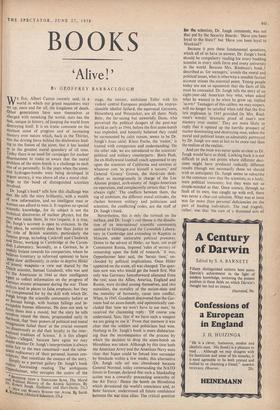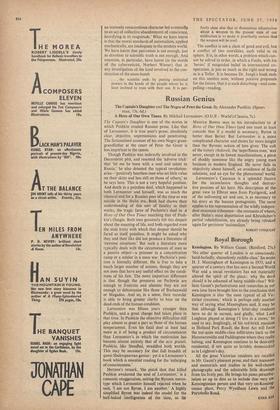BOOKS
'Alive!'
BY GEOFFREY BARRACLOUGH WE live, Albert Camus recently said, in a world in which our grand inquisitors may set up, once and for all, the kingdoms of death. Other generations have seen themselves as charged with remaking the world; ours has the task, unique in history, of keeping the world from destroying itself. It is an ironic comment on the exultant sense of progress and of increasing mastery over nature which, back in the Thirties, Was the driving force behind the discOveries lead- ing to the fission, of the atom, that it has landed IAS in the greatest moral quandary of all time. Today there is no need for campaigns for nuclear disarmament to make us aware that the moral problem of the atom-bomb is a challenge to each One of us personally. In the years when the atom- and hydrogen-bombs were being developed in urgent secrecy, it was above all else a moral chal- lenge to the band of distinguished scientists involved.
Dr. Jungk's book* tells how this challenge was Met. He tells the story brilliantly, with a wealth Of new information, and no intelligent man or Woman can afford to miss it. It requires no special scientific knowledge, for its subject is not the technical discoveries of nuclear physics, but the ,n-len who made them. In two respects, it is true, Dr. Jungk's account is open to criticism. In the first place, he certainly does less than justice to the role of British scientists, particularly the famous group, including Cockroft and Chadwick and Dirac, working in Cambridge at the Caven- dish Laboratory. Secondly, as a German, he is unduly lenient towards his compatriots, whom he believes (contrary to informed opinion) to have gone slow' deliberately, in order to deprive Hitler of atomic weapons—a view not shared by the Dutch scientist, Samuel Goudsmit, who was sent by the Americans in 1944 as their intelligence agent to collect information on the progress of German atomic armament during the war. These defects lead in places to false emphasis; but they are compensated for by the skill with which Dr. Jungk brings the scientific community before us as human beings, with human failings and in- escapable human dilemmas. He does not seek to force them into a mould; but the story he tells the round the thesis, propounded early in rine book, that 'their powers of political and moral imagination failed them' at the crucial moment `as disastrously as did their loyalty, to the inter- national tradition of Science.' It is this alleged r .ud a u re—`alleged,' because here again we may autbt whether Dr. Jungk's interpretation is always quite fair to the men concerned—and the subse- quent rediscovery of 'their personal, human con- sciences,' that constitute the essence of the story.' n„,',IniPlY as a portrait gallery Dr. Jungk's book fascinating reading. The ambiguous "Pnenheimer, who occupies the centre of the BRIGHTER THAN A THOUSAND SUNS. The Moral ld Political History of the Atomic Scientists. By Robert 1ungk. (Gollancz and Hart-Davis, 21s)
D
1.I 184EN AND WOMEN BEHIND THE TOM. By Sarah '`ednlan. (Abelard-Schuman, 15s.)A stage, the sinister, ambitious Teller with his violent central European prejudices, the impres- sionable idealist Szilard, the equivocal Germans, Heisenberg and Weizsiicker, are all there. Niels Bohr, the far-seeing but unworldly Dane, whO perceived the political dangers of the post-war world as early as 1944, before the first atom-bomb was exploded, and honestly believed they could be surmounted by calm reason, seems to be Dr. Jungk's beau ideal; Klaus Fuchs, the 'traitor,' is treated with compassion and understanding. On • the other side, we are introduced to the scientists' political and military counterparts : Boris Pash, the ex-Hollywood football coach appointed to spy upon the scientists of California and anxious at whatever cost `to prove himself a success,' and Geheral 'Greasy' Groves, the third-rate desk- officer so incongruously in charge of the Los Alamos project, arch-enemy of Anglo-American co-operation, and complacently certain that 'I was always right.' The conflicts between them, the tug of ambition, the different moral attitudes, the clashes between military and politicians and scientists, the conflicting codes, are the stuff of Dr. Jungk's book.
Nevertheless, this is only the turmoil on the surface, and Dr. Jungk's real theme is the dissolu- tion of an international scientific community centred in Gottingen and the Cavendish Labora- tory in Cambridge and extending to Kapitza in Moscow, under inexorable political pressures. Down to the advent of Hitler, no State, not even Communist Russia, imposed 'rules of secrecy or censorship upon the field of research.' It was, Oppenheimer later said, the `heroic time,' un- clouded by political implications. Once Hitler appeared on the scene, all was changed. The ques- tion now was who would get the bomb first. Not only was Germany henceforward alienated from the rest; soon the Allies, America, England and Russia, were divided among themselves, and two moralities, the morality of the nation-state and the morality of humanity, came into conflict. When, in 1945, Goudsmit discovered that the Ger- mans had no atom-bomb, and optimistically con- cluded that `now we won't have to use ours,' he received the chastening reply : 'Of course you understand, Sam, that if we have such a weapon we are going to use it.' From that moment it was clear that the soldiers and politicians had won. Nothing in Dr. Jungk's book is more dishearten- ing than the inconsequence of the process by which the decision to drop the atom-bomb on Hiroshima was taken. Although by this time both the American Army and the American Navy were clear that Japan could be forced into surrender by blockade within a few weeks, this alternative (Dr. Jungk tells us) was abandoned because General Norstad, today commanding the NATO forces in Europe, declared that such a 'blockading action was a cowardly proceeding unworthy of the Air Force.' Hence the bomb on Hiroshima which devastated the world's conscience and, as Bohr foresaw, undermined all future confidence between the war-time allies. The critical question for the scientists, Dr. Jungk comments, was not that put by the Security Boards: 'Have you been loyal to the State?' but 'Have you been loyal to Mankind?'
Because it puts these fundamental questions, which all of us have to answer, Dr. Jungk's book should be compulsory reading for every budding scientist in every sixth form and every university in the world. Because Mrs. Riedman's
described as 'for teenagers,' avoids the moral and political issues, what is otherwise a sensible factual account misses the essential point. Young people today are not so squeamish that the facts of life must be concealed. Dr. Jungk tells the story of an eight-year-old American boy who, when asked what he wanted to be when he grew up, replied 'ALIVE!' Teenagers of this calibre, we may suspect, will no longer be satisfied when told that the first test explosion in 1945 provided (in Mrs. Ried- man's words) 'dramatic proof of man's new mastery over matter.' They are more likely to reply that it opened up the horrific prospect of matter dominating and destroying man, unless the moral and political issues so admirably portrayed by Dr. Jungk are seen at last to be more real than the realism of the realists.
And yet the issue was never quite so clear as Dr. Jungk would have us think. Looking back it is not difficult to pick out points where different deci- sions might have produced radically different results (though not necessarily those we should wish or anticipate). Dr. Jungk seems to subscribe to the common view that the scientists; as a body, were political innocents; but they were not so simple-minded as that. Once science, through no fault of its own, was caught up with evil, there was never a clear-cut solution. What was at issue was far more than personal deficiencies on the part of leading individuals. The real tragedy, rather, was that 'the sum of a thousand acts of
an intensely conscientious character led eventually to an act of collective abandonment of conscience, horrifying in its magnitude.' What we have learnt is that the moral standards of nationalism, applied mechanically, are inadequate in the modern world. We have learnt that patriotism is not enough, just as devotion to scientific truth is not enough. And scientists, in particular, have learnt (in the words of the cyberneticist, Norbert Wiener) that in any investigation of the kind involved in the con- struction of the atom-bomb
. . the scientist ends by putting unlimited powers in the hands of the people whom he is least inclined to trust with their use. It is per- fectly clear also that to disseminate information about a weapon in the present state of our civilisation is to make it practically certain that the weapon will be used.
The conflict is not a clash of good and evil, but a conflict of two moralities, each valid in its sphere. It is, in other words, a problem which can- not be solved to order, in which a Fuchs, with his `heroic' if misguided belief in international co- operation, is just as much in the right and wrong as is a Teller. It is because Dr. Jungk's book ends on this sombre note, without positive proposals for the future, that it is such disturbing—and com- pelling—reading.



































 Previous page
Previous page